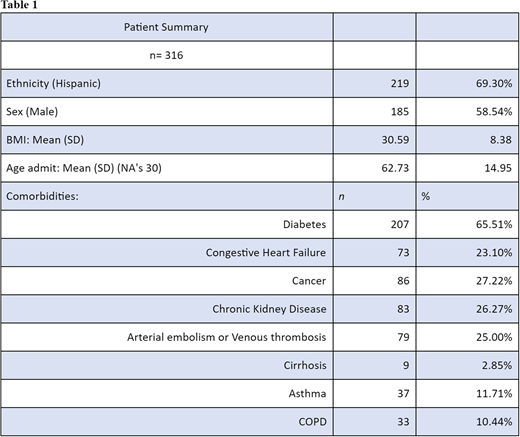Introduction:
Minority healthcare disparities are well known in many areas of medicine. Higher mortality has been reported in minorities with different cancer types despite adjusting for income or education. In hematological malignancies the trend persists. Despite favorable prognostic factors upon diagnosis of acute myelogenous leukemia, the mortality risk for Latinos and African Americans is higher by 12% and 7%, respectively. Both incidence and mortality in acute lymphoblastic leukemia are highest in Latinos. In Hodgkin's Lymphoma, Latino and African American adolescents and young adults have a higher risk of death at 35% and 62%, respectively.
The COVID-19 pandemic has drawn attention to the immense disparities in healthcare outcomes in minority communities. Disproportionate rates of hospitalization and death related to COVID-19 have been reported across the nation, highlighting the stark consequences of historic racial and economic injustices. With these findings comes a call to action and an urgency to create systemic change to promote health equity.
Methods:
Patients hospitalized at any Scripps Health hospital in San Diego County from March 1, 2020 to July 30, 2020 with a PCR confirmed diagnosis of COVID-19 and blood type were included in the analysis (n = 316). Demographic, laboratory and clinical data were extracted from the electronic medical record and included age, ethnicity, BMI, sex, medications, co-morbidities, blood type, white blood cell count, lymphocyte count, hemoglobin, platelets, ESR, CRP and D-dimer. Outcomes of interest included length of say (LOS), intensive care unit (ICU) admission, intubation and mortality. Analysis was performed with an a priori predictor of Latin American ethnicity. Linear regression analysis of LOS, logistic regression of other variables and age-adjusted regression was done. Demographic characteristics that were predictive in univariate analysis with p< 0.1 were included in a multiple regression model for each outcome with Latin American ethnicity as a predictor. If the potentially predictive demographic characteristic maintained trends toward significance (p<0.1), the predictor was retained in the model to produce the final regression results for each outcome.
Results:
Hospitalized COVID patients were predominantly male, obese (BMI 30.6) and average age was 63 years. 69.3% of patients were Hispanic. 65.51% of patients were diabetic, 26.27% had chronic kidney disease and 23.10% had congestive heart failure. Additional patient characteristics are included in Table 1. Median length of hospital stay was 16.5 days, 59% were admitted to the ICU, 37% were intubated, and 27% died. Blood type was not found to be a predictor of outcomes. The odds ratio (OR) of age adjusted LOS for Latinos was 1.01 days (p-value 0.60), 1.06 for ICU admission (p-value 0.80) and 0.82 for death (p-value 0.50). After adjusting for age and other potentially predictive characteristics, Hispanic ethnicity was not predictive of poor outcomes.
Conclusion:
In this retrospective analysis of patients hospitalized for COVID-19 in San Diego County, there was a strikingly high rate of hospitalizations in Latino patients. While the 2019 United States Census estimates the Latino population in San Diego to be 34.1%, Latinos comprised nearly 70% of patients hospitalized with COVID-19 in the Scripps Health system. Despite the high rate of admissions in Latino patients, Latin American ethnicity was not a predictor of poor outcomes as previously reported in other populations. The underlying etiology of the high rates of COVID-19 hospital admission in Latinos is likely multifactorial due to overcrowding, lack of access to healthcare and higher prevalence of chronic illness as demonstrated by our cohort's increased incidence of co-morbid conditions.
No relevant conflicts of interest to declare.
Author notes
Asterisk with author names denotes non-ASH members.


This feature is available to Subscribers Only
Sign In or Create an Account Close Modal